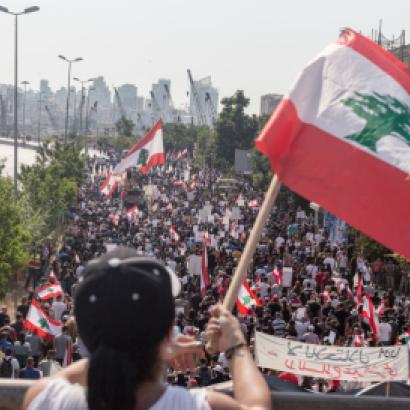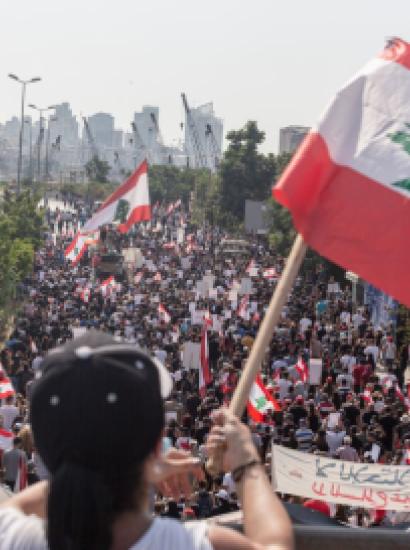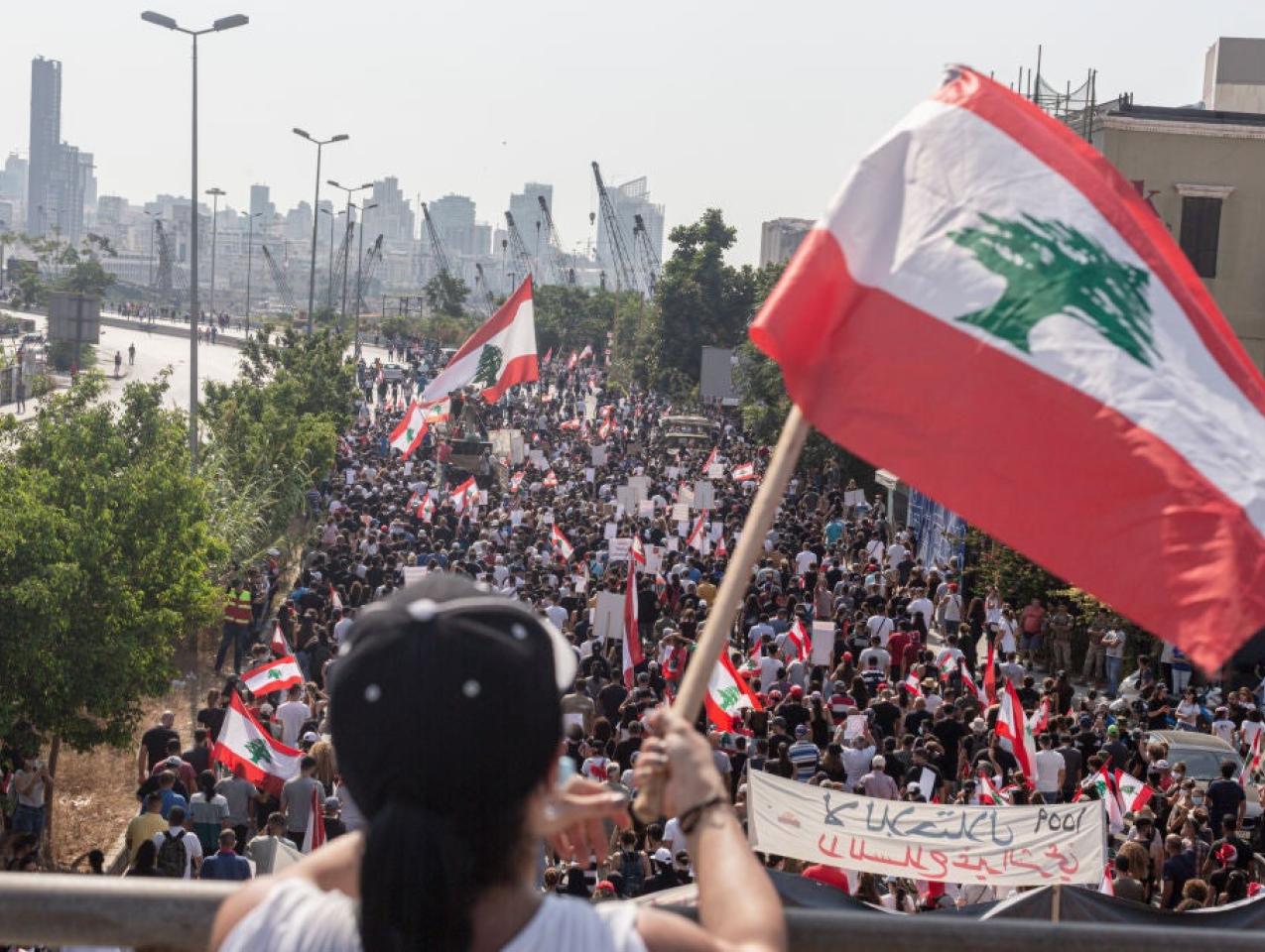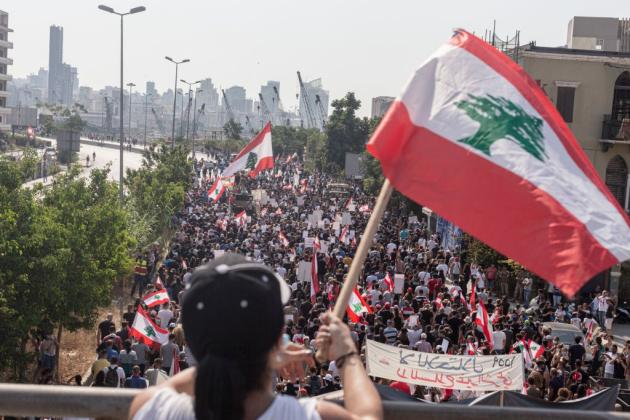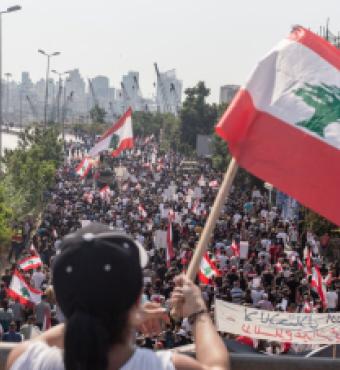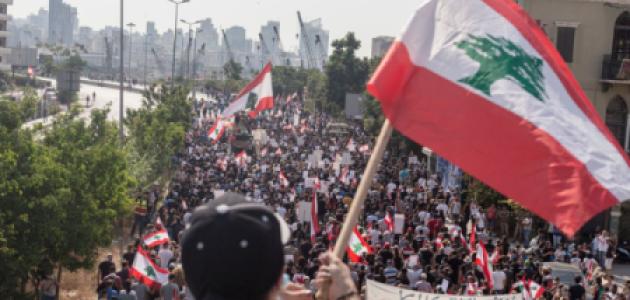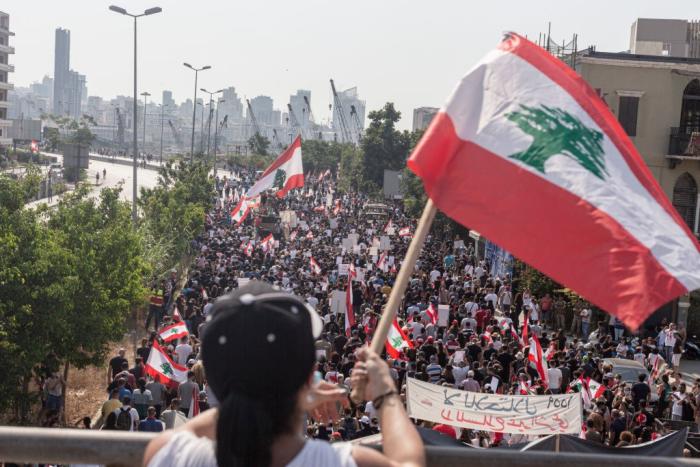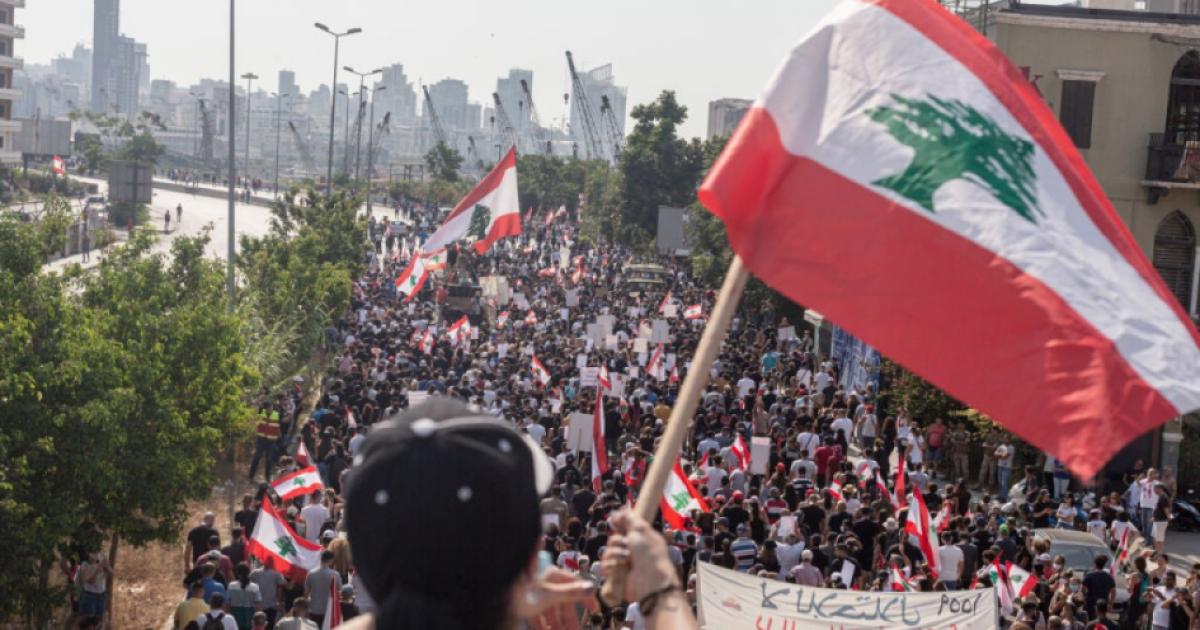- Middle East
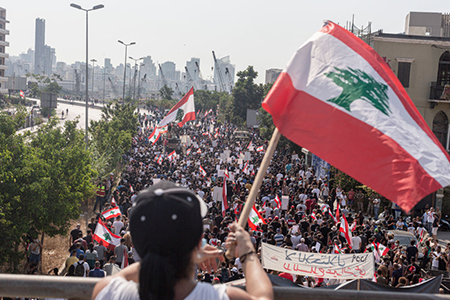
A new parliament and president will not change Lebanon’s “culture of impunity”
There was a forlorn little demonstration in the Lebanese capital, Beirut, last month. The families of people killed in the port explosion of 2020 walked through the streets, holding pictures of their dead relatives. Some of the marchers had placards that said: “We will not forget.” Many of the women wore black. They all ended up at the port, which is still a wasteland of tangled metal and rubble, and at 6:07 pm, the exact time of the explosion, they lit candles. The march was held to protest the continued obstruction of the criminal investigation into the explosion. The investigating judge was removed last year; his deputy, who replaced him, has been unable to work since January. One of the protesters, Paul Naggear, spoke to the Associated Press. The Lebanese government had been “complicit in the crime,” he said, and so Lebanese politicians were trying their best to stop the investigation. His three-year-old daughter, Alexandra – or “Lexou” as her family liked to call her -- was among those killed. He wanted this month’s elections in Lebanon, the first since the explosion, to help bring justice for her and the other victims. “The only solution is to remove this regime.”
Naggear has emerged as one of the most articulate voices from the families demanding accountability since August 5th, 2020, when a large part of some 3,000 tonnes of ammonium nitrate fertilizer stored at Beirut’s port exploded. He gave a television interview at the time, describing what happened to him that day. In the first moments after the blast, he couldn’t get his wife on the phone. He rushed home, frantic, to their apartment in the Christian neighbourhood of Gemmayzeh. He found her and their daughter unconscious under masonry and broken glass. Then, a waking nightmare: flagging down a motorcycle to take his daughter to hospital, finding the hospital half destroyed, running to another hospital, carrying the little girl through stationary traffic. Her brain was bleeding. She never woke up. After three days, she died, one of the youngest of as many as 240 people killed in the explosion. A well-known photograph shows Lexou and her father at mass demonstrations for reform the year before, the so-called October 2019 “Revolution”, a brief moment of optimism in Lebanon. A little girl with curly blonde hair and a mischievous smile sits on her father’s shoulders. She wears pink overalls and holds a Lebanese flag.
I call Naggear on WhatsApp to ask him about his hopes for change in these elections. When he talks about getting rid of “the regime” he doesn’t mean just the government of the day but a whole system based on the division of power after the Lebanese civil war. Thirty years after the war ended, the same warlords, or their children, are in charge, more entrenched than ever. The country remains divided along confessional and sectarian lines: Christian, Muslim, Druze, Sunni and Shia. Those divisions mean that people feel they have no choice but to choose the nation’s leaders from within their own communities. It's a system that all but guarantees incompetence because the same politicians are returned to power again and again: no one is ever held to account. It has also allowed corruption to flourish. Power is passed back and forth between the same elites, the same “mafias”. While supposedly rivals, they have long ago come to a comfortable accommodation with each other over the division of spoils. Naggear is on the board of Kulluna Irada – “We are all determined” -- a secular group that advocates for reform and which is fielding candidates in this election. He hopes one day to see the end of all the main political parties and their affiliates. “All of them should be uprooted.”
The blast at the port was one of the largest non-nuclear explosions ever, causing its own small earthquake. But even such a literally seismic event has failed to remake, or even much disturb, the political landscape. Many of those who were in government in the years when the unstable and deteriorating explosive material at the port should have been made safe remain in public life. These include two former ministers who are accused of having direct responsibility for the tragedy and who are running for office despite being the subject of arrest warrants. Ali Hassan Khalil, the former finance minister, and Ghazi Zeaiter, the former public works minister, are both -- technically – fugitives. They deny any wrongdoing. Naggear lists the destruction from the port explosion: not only the dead, but 6,000 injured, 300,000 made homeless, billions of dollars in damage to the center of Beirut “and still nobody behind bars, none of those really responsible.” How, he wonders, could his fellow Lebanese even consider voting for such creatures? “It's disgusting…In what a hell of a country would we imagine such things?” But not only are Khalil and Zeaiter running, they will almost certainly win, and will soon be back in parliament, perhaps back in government.
Lebanon elects its MPs using proportional representation and, as is usual under PR, party leaders control the lists of candidates. Lebanese politicians also sit atop a vast, rotten pyramid of patronage: if you want a job in the government bureaucracy, or just a new washing machine, the election is a good time to ask for these things. In return, the leadership of the party offering you these gifts will tell you which candidate to vote for on their list. This matters because under the Lebanese system of PR, you have two votes, one for a party list and one for a candidate among the names on that list. Khalil and Zeaiter are members of the Shia party Amal – Khalil may be its second most powerful figure. The party leader, Nabih Berri -- Speaker of Parliament and one of the old warlords – named both men as candidates at Amal’s campaign launch. The message to Amal’s voters – or clients -- was clear. Paul Naggear feels resigned about the ability of Lebanon’s political class, always, to protect themselves. “There's nothing I can't believe of such inhumans…this is what we expect from them. We have no truth. We have no justice. We live in a country where there is no rule of law, where there's total impunity.”
The judge leading the investigation into the port explosion, Tarek Bitar, is trying to challenge this culture of impunity. His dogged independence has come as a shock, not least to the political class. He issued the arrest warrants for Khalil and Zeaiter after they refused even to appear for questioning. They were relying on their immunity from prosecution as members of parliament, so Bitar twice signed warrants while parliament was not in session. In January, the government’s response was to hastily call an extraordinary parliamentary session to start immediately and last until the regular session began. Anyway, it was always unthinkable that the Lebanese security forces would act on the warrants. Senior officers answer to the former warlords who run the country. And some are under suspicion themselves for failing to prevent the explosion. They made it clear they would simply wait until the legislature returned and the warrants expired. Judge Bitar threatened them with arrest, too.
In response, Judge Bitar has been assailed by 26 successive lawsuits calling for his removal, according to a count by the port families. The lawsuits -- many of them brought by lawyers acting for Khalil and Zeaiter -- accused him of bias and procedural irregularities. He might end up being removed, like his predecessor; but short of that, his work is paralysed. This is possible because most Lebanese judges are not independent but owe their jobs to sectarian politicians – politicised decisions result. Unsurprisingly, the judiciary is one of the most disliked and distrusted institutions in Lebanon. Even if Bitar survives, there have been moves in parliament to take the case against the former ministers away from him. He would be left with other, lesser defendants, while the x-ministers would be tried in a court formed by parliament itself. This is lawfare but the parties ruling Lebanon -- most founded on militias – also resort easily to violence. When the families staged a peaceful sit-in at parliament last year, they were attacked by men in black who hit them with batons, shouting: “How dare you insult Nabih Berri?!” These were, apparently, the parliament’s police. Last October, Amal and the senior partner in the Shia alliance, Hezbollah, organized protests against Judge Bitar’s investigation that led to the worst street fighting in Beirut in more than a decade.
With the judge unable to complete his work, the most comprehensive public statement on what happened at the port comes from an American organisation, Human Rights Watch. It is available in Lebanon’s three languages, Arabic, French and English, and should be read by every voter. Khalil and Zeaiter – along with others at the very top of the Lebanese government at the time – are accused of negligently ignoring repeated warnings about the ammonium nitrate. But the report also draws on multiple sources to paint a damning picture of corruption at the port. All the main political parties have their own customs officials there, each of them untouchable, by mutual agreement. As the Lebanese investigative journalist Riad Kobeissi told Human Rights Watch: “The port was not intended as something that will bring in revenue to the state…it acts to fill the pockets of the mafias running the country.” Those in charge of the port – and their political bosses -- were too busy making money to think about what was stored in Hangar 12, where the ammonium nitrate smouldered.
In the days and weeks after the explosion, ordinary Lebanese seemed to accept this explanation, that incompetence, greed and corruption caused an explosion bigger than any single act of destruction in the country’s long civil war. This reflected their own experience of life in Lebanon: a survey by the anti-corruption group Transparency International found that 40% of Lebanese had personally paid a bribe in the previous year. But, slowly, evidence began to emerge of another explanation, one some people had suspected right from the start: that the Shia movement Hezbollah – the “Party of God” -- was ultimately behind the catastrophic decision to store tons of explosive material in the heart of Beirut. Hezbollah are the only Lebanese party allowed to retain their weapons, because they were engaged in armed resistance to the Israeli occupation of southern Lebanon. They are more powerful than Lebanon’s army. Yet, they answer to another country, Iran. They are often, correctly, described as a state-within-a-state. For many Lebanese, from all religions and sects, this is the most important issue of this election, or of any election.
There are some brave Shia critics of Hezbollah. Lokman Slim was one. He was a publisher, activist and journalist and, in January of 2021, he gave an interview to an Arabic satellite news channel, setting out the evidence that Hezbollah was implicated in the port tragedy. He was a bald, sometimes bearded, stocky man in his late 50s, a brilliant talker. His widow, Monika Borgmann, describes the TV interview as a “very, very strong” condemnation of Hezbollah – strong because it relied on facts rather than rhetoric. Slim, she tells me, spoke in a “very logical way” and succeeded in “putting together the puzzle” of the ammonium nitrate: how it arrived in Beirut, how some of it went missing. It was a story about the Syrian regime’s need for more explosives to use in barrel bombs, Russian support for the regime, and three Syrian-Arab middlemen – Christians -- with Russian citizenship. Slim suggested that Hezbollah had brought the explosives to the port for use in Syria. Nothing could happen there without their knowledge and blessing. “We have before us a war crime whose parties are Moscow, Beirut and Damascus.” A month later, he was killed.
Borgmann tells me now on the phone that Slim wanted a secular Lebanon but also, as a first step, an alternative to Hezbollah within the Shia community. He wanted mafias and militias out of politics. “The fight against the culture of impunity in Lebanon has always been at the center of our work.” They met twenty years ago, when she came to Beirut to make a film. They ended up making it together: It was titled, Massacre, about the murder of Palestinian refugees in the Sabra and Shatila camp in 1982. They started a charity, Umam, to document the vast areas of Lebanon life and history that are taboo in public, especially any honest discussion of the civil war. In a country where everyone forgets but no one forgives, they wanted to replace a “culture of impunity” with a “culture of remembrance”. As could be expected of a man with such a mission, Slim was fearless. “Lukman was talking in public just like he was talking in private. He was very vocal about Hezbollah.”
Slim’s father was Shia, his mother, who survives him, is Christian. His father was a Member of Parliament, from a well-known family, and Slim exuded the self-confidence of a Shia notable. He studied at the Sorbonne -- philosophy and ancient languages --and returned to Lebanon just after the end of the civil war. Being a public critic of Hezbollah was never easy and Borgmann remembers a steady stream of threats. But things got much worse after the “October Revolution” of 2019 – the demonstrations where Paul Naggear marched with his daughter on his shoulders. Slim often went to a huge tent put up by the protesters in Martyrs Square in the centre of Beirut. A debate took place there one night on Lebanese ‘neutrality’. To Hezbollah, this was political heresy, a questioning of Lebanon’s permanent state of war with Israel and of the continued “resistance” on which Hezbollah’s identity is based. Hezbollah’s supporters were incensed when a former Lebanese ambassador to the UN, attending the debate, spoke of ‘Israel’ instead of ‘the Zionist entity’. They arrived in force. Slim was recognised. He and others were escorted to safety by the police. The following day, the tent was burned to the ground.
The trouble did not end there. A mob broke into Slim’s family villa, in the southern suburbs of Beirut. They plastered Hezbollah posters over the walls and spray-painted threats: “Death to the traitor…Agent [of Israel]…The [pistol] silencer will come.” Slim replied with a public letter on his Facebook page stating that if anything happened to him, or to his family, then Hassan Nasrallah, the leader of Hezbollah, and Nabbih Berri, of Amal, should be held responsible. Borgmann does not believe, therefore, that the interview about the port was the sole cause of her husband’s murder. And there is one more thing. A respected Lebanese journalist reported that Slim was talking to a senior Hezbollah official who wanted to defect with secrets of the group’s revenues from smuggling and drugs. Slim was, supposedly, about to deliver this man safely to the US government. Whether or not that particular story is true -- and Borgmann does not confirm it -- she tells me: “There were several elements [causing friction with Hezbollah] which became, in the end, too much, and then the decision was taken.”
Slim was found dead in his car on a quiet country road in southern Lebanon, in an area under Hezbollah’s firm control. A post-mortem examination arranged by his family found that he had been shot six times, five times in the head, once in the back. The examination found bruising on his knees and arms, as if two strong men had been holding him, making him kneel on the ground before firing the first shot into his back. His body was left slumped over in the passenger seat of the car. It is more than a year since the murder, but no one has been arrested, no one charged. Borgmann tells me she doesn’t think this necessarily means that Hezbollah is actively blocking the investigation, as is happening with the port inquiry – they don’t need to. No one wants to dig too deeply. When she had to give her statement to the authorities, they “asked a lot of personal questions. They didn't ask me one question about all the threats Lukman had been receiving.”
Borgmann fears that Hezbollah and Amal will use violence in this election campaign. “There is a lot of intimidation going on now, at least in the south.” In one incident last month, a dozen tough looking young men with crew cuts and black t-shirts stopped people from entering a meeting with opposition candidates in the village of Sarafand, in Nabih Berri’s election district. They threw rocks at the place where the meeting was being held, a local restaurant, and they gave a savage beating to one man trying to get in. Finally, a pistol was pulled out and shots fired. One of the candidates, a surgeon named Hicham Hayek, told Al Jazeera that members of both Amal and Hezbollah were to blame. His group was from a slate called Together for Change. The armed mob shouted accusations that they were “foreign agents”. A few weeks earlier, Berri had given a speech in the district, warning darkly about opposition forces whose “cadres were educated and trained abroad…funded with hundreds of millions of fresh dollars.” Amal, as is usual, denied being behind the violence. Hezbollah, on this occasion, was silent.
Borgmann believes it will take “real courage” for people to go back to their villages in the south and vote for candidates from the new opposition parties. But even more dangerous than militia thuggery, she says, is the lack of unity among those parties. Across the country, there are no less than 103 separate lists of candidates – a sign of how tired people are with the way things are. She is “disgusted” that the forces for change could not achieve a common front. “I am very much afraid that Hezbollah and its allies will be the big winners. This will be a catastrophe for the country.” Makram Rabah also laments this lack of a common front. He is a Druze and lectures in history at the American University of Beirut. He was in the Martyrs Square tent with Slim and believes the most important issue for Lebanon is “sovereignty”: Hezbollah’s weapons, which in his view make Lebanon a satellite of Iran. “The revolution will come,” he says. “But it will come when you have a united front of people asking for the lifting of the Iranian occupation of Lebanon.”
Someone like Paul Naggear believes that corruption is the main evil afflicting Lebanon and Hezbollah’s influence is just one more problem on top. Rabah, on the other hand, thinks that “Hezbollah are the people protecting the corrupt establishment” and in return that establishment allowed Hezbollah “to turn the port into an ammunition dump”. Together: “These people are a ruling junta, which has killed us with the port explosion, and which still refuses to let the judiciary do their work. The corruption reaches a different level with Hezbollah being on board. It's what I call corruption on crack.” In his view, Hezbollah is “not well-versed” in the interminable horse-trading that constitutes politics in Lebanon and was happy to leave this to Iran’s ally, Syria, until the Syrian occupation ended in 2005. “Hezbollah doesn’t like to do politics. They don't care about the process. Hezbollah is a spartan entity that does military. They care only about the ability to legitimize their weapons.” The other ruling parties were afraid of Hezbollah, he said, or they thought that Hezbollah could eventually be reformed. But “Hezbollah will never be reformed. It's not in their DNA.”
Without the Shia alternative that Lokman Slim campaigned for, Hezbollah and Amal will probably sweep all 27 seats given to them under Lebanon’s division of parliament by religion and sect. This confessional allocation of seats means that even candidates running as secular independents must be on a list that voters choose according to sect. In 2018, only one candidate was elected out of 66 standing for parliament in that election’s secular coalition of civil society activists, Kulluna Watani, “We are all one nation”. This candidate, Paula Yacoubian, may have won, in part, because of support from the bloc of Armenian Orthodox voters in her district, Beirut 1. Makram Rabah says: “If you try to act outside your own sect, you won't find a place to do that.”
There’s another barrier against change. It is what Rabah calls “gerrymandering”. He doesn’t mean a redrawing of boundaries to put voters for one party in the same district (though there have been accusations of this, too). Instead, he says, Lebanon’s PR was “custom fitted” to the existing parties when the new system was created for the 2018 elections. There’s a threshold for parties to be eligible to win seats, he explains. It is the number of voters in the district divided by the number of seats. Say there are 100,000 voters in a district, and ten seats there, the threshold would be 10,000 – “too high” for the smaller parties to reach. PR is supposed to open-up the political system to new parties and to independents. Lebanon’s PR keeps them out.
The civil society groups, democracy activists and anti-corruption campaigners now daring to enter Lebanese politics might have beaten the system by holding informal primaries. But – as Monika Borgmann bitterly complained -- they did not do that. The change vote will split. Change candidates and their party lists will probably fail to reach the threshold to enter parliament in any significant number. So, despite an opinion poll earlier this year showing 40% support for independents, most of the traditional parties can expect to do well compared to the newcomers. And as Rabah points out, since much of an election’s outcome is already decided based on sect, the big parties are really “just fighting over a couple of vacant seats”. Competition is within sects, not between them.
Among the Maronites, Lebanon’s sect of Eastern Catholics, Samir Geagea, the leader of the Lebanese Forces party, is challenging Gebran Bassil, leader of the Free Patriotic Movement. This is the biggest party in parliament and also the party of the President, Michel Aoun, who happens to be Bassil’s father-in-law. Geagea’s militia and Aoun’s once fought each other in the streets of Beirut, during the civil war. Geagea opposes Hezbollah and is therefore trying to pick up support from Sunnis. Their traditional home, the Future Movement, imploded with the decision of its leader, Saad Hariri, to give up politics, a profession he was clearly never suited to. There are other Sunni groups running, of course, but Geagea hopes to gain enough votes to make the Lebanese Forces into parliament’s biggest party. This is despite being convicted of war crimes in the civil war and being charged now with ordering an attack on Hezbollah supporters during the street fighting last October. The Free Patriotic Movement, on the other hand, is allied to Hezbollah. Bassil hopes to hang on to enough MPs to replace his father-in-law as president. This is despite being sanctioned by the US under the Magnitsky Act. The US Treasury Secretary said Bassil “exemplified” the “systemic corruption” in Lebanese public life. Both Geagea and Bassil say the charges against them are political (Geagea having a better argument than Bassil on this point).
Whatever the composition of the new parliament, there seems to be one constant of Lebanese politics. It is that Nabih Berri is Speaker, a job he has held for 30 years. He is 84 now and perhaps the ultimate symbol of the permanence of the Lebanese political class and the clientelism that keeps them in power. Makram Rabah – the university historian – says that whether parties and candidates are for Hezbollah or against them during the campaign, once the new parliament meets, they all seem to agree on voting for Berri, Hezbollah’s ally and facilitator. “Which means that these people are all part of the same organized crime unit. We need a new system, not new people.” Borgmann – the murdered Lukman Slim’s widow – fears that a biased system will give spurious legitimacy to traditional parties who will win by intimidation and ballot rigging. She wonders if all of the new opposition forces should not “just retire” and boycott the election.
Dr Khaldoun Sharif is certain there should be a boycott of the election -- by the voters. He is trying to convince anyone who will listen to follow his example and stay at home on polling day. This is all the more remarkable because he used to be an advisor to the Lebanese prime minister, Najib Mikati, though the first time that Mikati was prime minister, a decade ago. Sharif is so furious because, like many of Lebanon’s middle class, he lost his life savings in the great banking crash of 2019. Although he had a brief spell in government, for most of his working life he made his living as a pharmacist. He managed to put aside just over $300,000 for his old age. But one morning in October 2019, like the rest of Lebanon, he woke up to find the banks shuttered, and his savings out of reach. “No one told me that a thing like this can happen. These people took my money, the money I put in the bank for my retirement. If I stop working, I don't have any support. I don't have anything.” By “these people,” he means the government, the political elite, as much as the bankers.
The banks reopened their doors two weeks after the crash in 2019, but they still wouldn’t let depositors like Dr Sharif have their money. Since then, his savings have dribbled out, a little at a time, at far less than face value. He is not allowed to take out dollars, only Lebanese lira. The current, official, exchange rate is 8,000 to the US dollar. The black market or street rate – that is the real value of the Lira – is 25,000 to the dollar. He has, therefore, lost more than two thirds of the value of his savings. He expects that the next government, whoever that might be, will devalue what he has left even more. Voting seems like inviting the same gang of thieves to rob you twice. “It will not change anything and it will legitimize what the political elite of Lebanon tried to do -- and what they are going to do after the election. They will take everything. If they can reach the breath that people exhale, they will take that.”
Sharif suspects that the well-connected were tipped off and got their money out before the crash: Lebanon’s billionaires and multi-millionaires, the political elite and their friends. Lebanese have grown so cynical that no one was especially shocked when a Lebanese court charged the governor of the Central Bank, Riad Salameh, with illegal enrichment and money laundering. The investigating judge said that Salameh and his brother formed three real estate companies with a Ukrainian woman and secretly bought property in France worth $12m. This is part of a much larger case. The European Union's criminal justice agency believes Salameh is connected to $130 million of Lebanese assets that have now been frozen. And Swiss prosecutors suspect him of embezzling around $330 million, according to a letter from the Swiss attorney general sent to Lebanese officials and seen by Reuters.
Despite these enormous sums, Salameh has said that public funds were not a source of his wealth. He remains as Central Bank governor. For many years, he was a hero to the Lebanese, for his success in keeping the lira pegged at the value of 1,500 to the dollar. This was wildly popular because it made everyone feel richer than they really were. People got used to having foreign maids, foreign cars and foreign holidays – all paid for with their over-valued currency. But this rested on an illusion. Lebanon didn’t export much. The Lebanese were not noticeably better educated or more skilled than people in poorer countries they sometimes seemed to look down on. As one former banker put it to me, as if addressing his fellow Lebanese: “You think you’re better than the Egyptian pumping your gas? You’re not.”
The lira defied economic reality as long as it did because the Central Bank was overseeing a Ponzi scheme. People gave their dollars to the commercial banks, which converted them to lira, and offered double digit interest rates. The dollars were lent to the Central Bank, which printed lira to cover the interest rates, and used the dollars to intervene in the currency markets, buying the lira to prop up its value. This also allowed the Central Bank to keep giving money to the government of the day to bribe its supporters. Like any Ponzi scheme, it worked only as long as money was continually sucked in. And only as long as people had confidence, however misguided, that they could get all their money out. As the global economy slowed down, Lebanese abroad stopped sending dollars back home to deposit. The banks kept raising interest rates, a sure sign of trouble. A Lebanese billionaire living in London told me he had been offered a 25% return if he would make a large transfer of cash to Beirut. He refused. He was right to – these were the final days before the crash.
Dr Sharif says the resulting mess is too big for anyone running for office now to fix – and that includes the idealistic new opposition candidates. He thinks there will have to be a new grand bargain between Lebanon’s different groups, negotiations for a new constitution, an agreement to decide the issue of Hezbollah’s arms. The Lebanese have never really been able to implement anything important themselves, he tells me. He says that the last time there was general agreement about anything among the Lebanese parties was in 2006, when everyone said that Palestinians outside the camps in Lebanon should be disarmed – his issue – and it never happened. So, he says, the grand bargain can be achieved only with the help of outside powers to mediate, say neutral Switzerland, or the French, or the Egyptians, even the Vatican. I’ve heard several versions of this from Lebanese: we are a failed state; it’s past the point of no return, Lebanon needs help to save itself. A senior figure in the Christian community told me over lunch about a scheme he had to divide the country into sectarian cantons, mini-statelets (the only way to break with Hezbollah). The US and European countries should send peacekeepers to guard the Christians in their cantons, he said – a fantasy.
Dr Sharif puts a precise figure on his plan for Lebanon. If 70% of the population can be persuaded to boycott the poll, he says, then the whole system will lose its legitimacy, not just the resulting government. Reform will be inevitable. Otherwise: “Who will stay in Lebanon? Only the old people who cannot leave.” He is a Sunni from Tripoli. An analyst told me that “we might be shocked” by how few people show up to the polls there. Even so, the ruling elites could probably find a way to ignore even the embarrassing absence of voters at an election. Lebanon is a country where you can go to jail for a tweet, but you can be indicted for mass killing in the port explosion and still run for office. And win. Instead, things may have to change because the money is running out. Eventually, there may be nothing left to keep the system of patronage going. For the time being, though, Lebanon’s economic crisis has, in some ways, perversely strengthened the traditional parties. People are hungry and the old power structures control access to shops with subsidized goods. You used to buy a vote for $100, they say, now you buy it for $10. Lebanon needs a “Change” election. This is not it.








